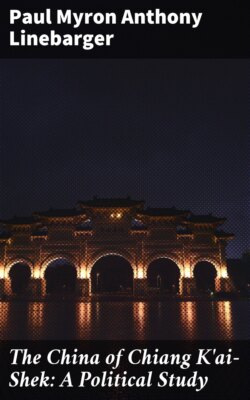Читать книгу The China of Chiang K'ai-Shek: A Political Study - Paul Myron Anthony Linebarger - Страница 10
На сайте Литреса книга снята с продажи.
Chapter I
THE CONSTITUTION
ОглавлениеTable of Contents
The constitutional system, basic in most Western states, plays a peculiar, subordinate role in China. Consideration of the issue of constitutionalism high-lights the most practical aspects of the issues of full democracy. Although the purely legal aspects of constitutional development are still unimportant in the internal power politics of China, further constitutional development involves a very real shift in the domestic balance of power. The fullness of national unity, and therefore the effectiveness of resistance against Japan, depend in part on the successful solution or compromise of the problems of constitutionalism.
Ever since the beginnings of political modernization in China, demands for constitutional government have included a written constitution as an imperative prerequisite. The formidable Empress Dowager was troubled in her last days by the Imperial constitution, a rather unimaginative plagiarism of the Japanese Constitution of 1889. Since the Republic began in 1912, China has continued constitutional drafting, amendment, replacement, and suppression; many of these constitutions have gone into legal effect. Law being what it was, practical politics flowed on untroubled.[1] Only with the establishment of the National Government at Nanking did constitutional structure and actual government develop similarities.
